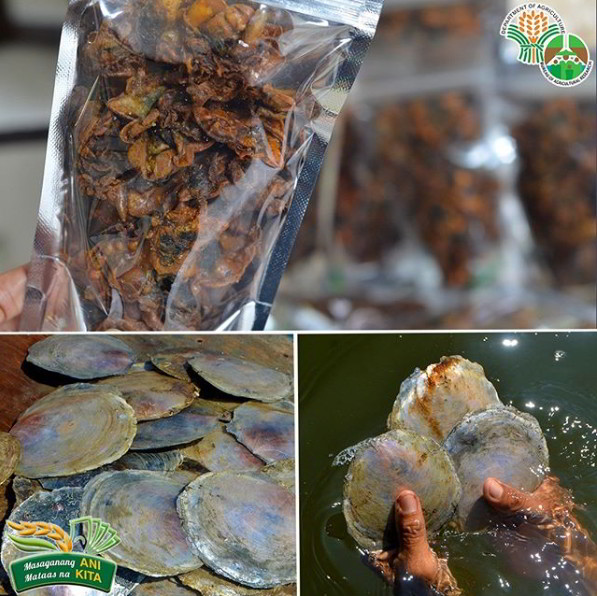
Kapis, also known as window-pane oyster (Placuna placenta), is widely recognized for its thin, translucent shell that has been traditionally crafted into lanterns, candle holders, window panes, lampshades, vases, and chandeliers. This remarkable marine resource is indigenous to various coastal areas in the Philippines and holds immense potential in both the local and global markets, whether as a raw material or a finished decorative product.
However, beyond its aesthetic appeal, kapis is an edible marine bivalve, much like tahong (mussels), talaba (oysters), kuhol (golden apple snails), and tulya (clams). In the municipality of Samal, Bataan, where kapis thrives abundantly, the local community has long been engaged in kapis shell craftsmanship, passing down the knowledge of shell processing from one generation to the next.
Transforming Kapis into a Delectable Filipino Delicacy
In addition to shell crafting, the kapis meat is now being utilized as an ingredient in various Filipino dishes, including adobo, afritada, and lumpiang shanghai. It is also processed into finger foods like chips and kropek, providing a new way to enjoy this protein-rich seafood.
The concept of kapis chips originated from a member of the KALIWANAG Rural Improvement Club (RIC)—a cooperative in Samal dedicated to the development of kapis-based products. According to Dr. Lilian C. Garcia, regional director of the Bureau of Fisheries and Aquatic Resources (BFAR) Region 3, this innovative approach has not only maximized the utilization of kapis but also created a new source of income for local communities.
Kapis Chips: A Nutritious and Sustainable Finger Food
Unlike commercially available mussel chips, kapis chips are smaller but exceptionally rich in protein, making them a healthier alternative for snack lovers. When properly stored, these chips can last for up to six months, ensuring their freshness and quality. Currently, they are available in two flavors: Original and Sweet & Spicy, and come in different packaging sizes:
- 75g – Php 100
- 150g – Php 200
- 250g – Php 300
These products can be purchased at the municipal and provincial tourism offices in Bataan and at the pasalubong center in Samal, Bataan.
Boosting Livelihood and Economic Growth in Bataan
Since its launch six years ago, kapis chips have gained widespread attention from buyers, contributing significantly to the local economy. According to Ms. Gladys T. Resubal, an aquaculturist from the Office of the Provincial Agriculturist in Balanga City, Bataan, this innovative product has helped increase annual revenue by an estimated Php 200,000, supplementing the income generated from kapis handicrafts.
To ensure a sustainable supply of kapis and prevent overharvesting, strict resource management practices have been implemented. As per Ms. Resubal, local fishery sanctuaries are stocked with over a ton of kapis breeders to support natural reproduction. Additionally, regulations prohibit the harvesting of kapis smaller than two inches and breeding stock, safeguarding the future of the industry.
Government and Industry Support for the Kapis Sector
The KALIWANAG RIC cooperative is one of the beneficiaries of the Technology Promotion and Utilization of Window Pane Oyster (Placuna placenta) Products project. This initiative, funded by the Bureau of Agricultural Research, is a collaborative effort between BFAR Region 3, the Provincial Government of Bataan, and the Local Government Unit of Balanga.
As key figures in the project, Dr. Lilian C. Garcia and Ms. Gladys T. Resubal recognized the vast potential of the kapis industry. They emphasized that applying appropriate technologies to fishery products enhances productivity, boosts income, and generates jobs. Through this initiative, the project aims to:
✔ Improve and diversify kapis-based products
✔ Enhance product packaging and branding
✔ Train and empower local cooperatives
✔ Upgrade production facilities
✔ Support the promotion and marketing of kapis products
With ongoing government and industry support, the kapis sector in Bataan continues to thrive, offering both sustainable livelihood opportunities and unique, high-value products for the local and global markets.
